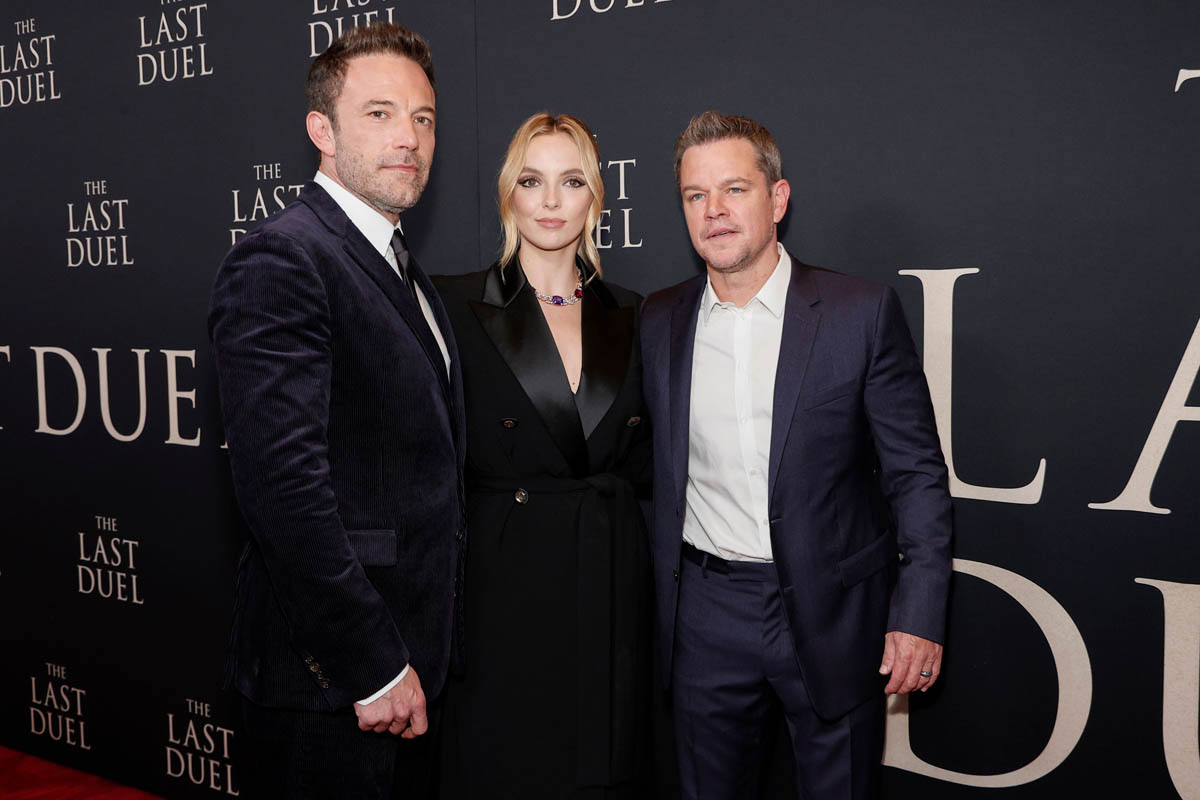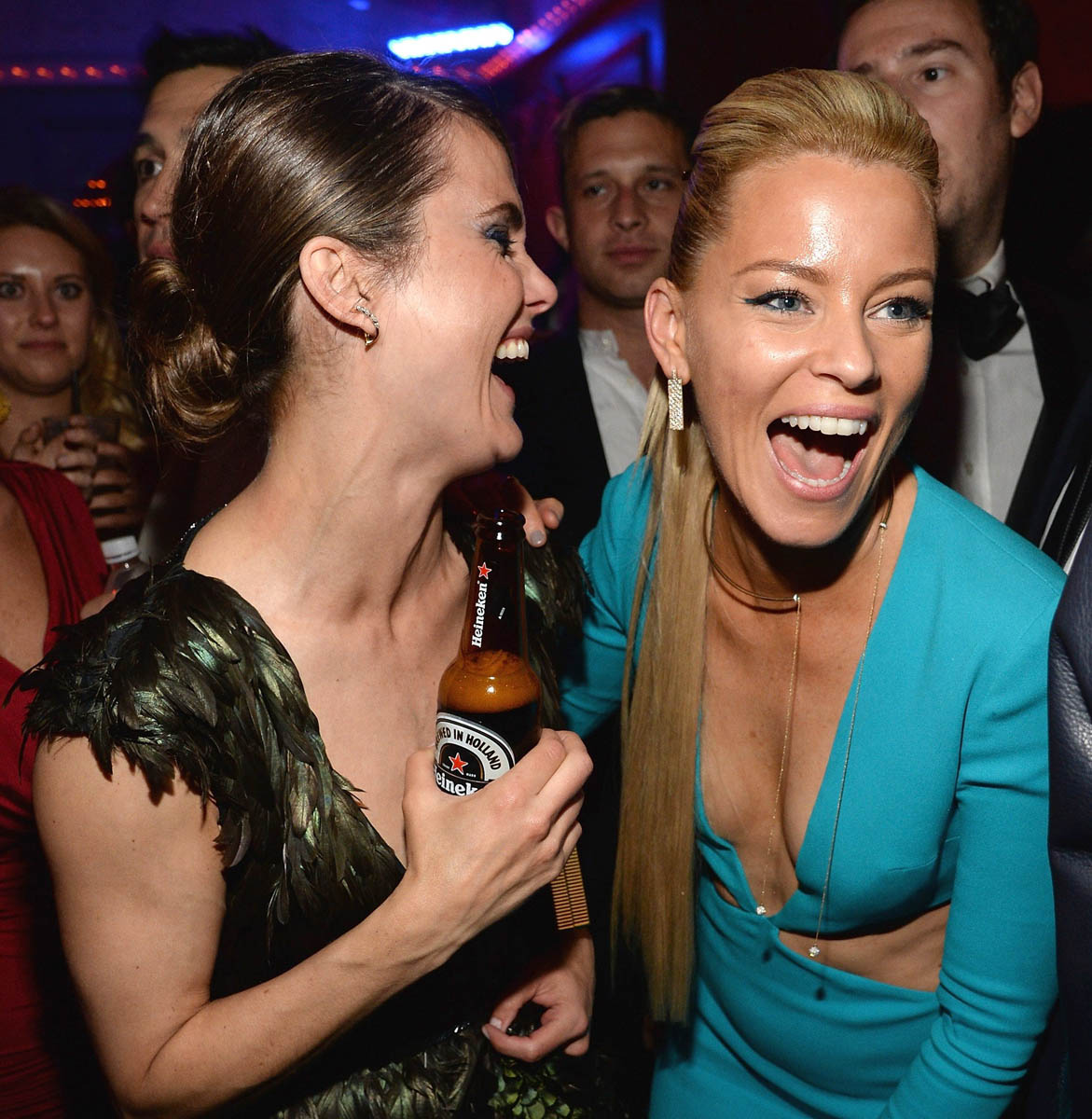Comer, Damon, and Affleck in The Last Duel



With an understanding that a film that depicts sexual assault on screen not once but twice simply will not appeal to everyone, I say that The Last Duel is one of my favorite films of the year so far. Is it perfect? No. Is it a hard watch? At times, yes. Is there a ton of historical horse murder? Abso-f-cking-lutely. But the ways in which The Last Duel flips the script on the historical epic, the ways subtle and overt it paints a stifling, strangling, gutting portrait of systemic misogyny and abuse that has barely changed in literal centuries makes it an engrossing story and almost defiantly engaging film. Adapted by Nicole Holofcener and Ben Affleck & Matt Damon from Eric Jager’s book of the same name, and directed by Ridley Scott, The Last Duel is as slyly observant as it is gut-wrenching.
In the fourteenth century, Lady Marguerite de Thibouville (Jodie Comer, absolutely flawless) alleges her husband’s frenemy, Jacques Le Gris (Adam Driver, absolutely flawless), sexually assaulted her while her husband, Jean de Carrouges (Matt Damon, flawless), is away from their home. The world being what it was and still is, Marguerite is not widely believed, and so the accusation is remanded to the local lord, Pierre d’Alencon (Ben Affleck, ABSOLUTELY F-CKING FLAWLESS), to decide. Pierre, who prefers Jacques at court, sides with his friend, and Jean and Marguerite then appeal to Charles VI, King of France, who decides the truth will be told through combat to the death. The duel between Jacques and Jean is the last time in France that combat was used to decide what is, effectively, a court case.
Duel is broken up into three “chapters” which overlap and overlay the story from three different perspectives. As much as there is zero interest in both-sidesing an assault story, how Duel utilizes this format is critical to shaping its meta-textual read on the story. Jean remembers saving Jacques’ life at the Battle of Limoges and thinks of himself as a benevolent and loving husband who encourages his demure wife to buy herself a new dress. Jacques remembers that he saved Jean’s life first at Limoges, that Jean is a coarse and temperamental man incapable of handling court politics, and that crude, illiterate Jean is hardly a suitable husband for the beautiful and witty, and well read, Lady Marguerite. Marguerite, meanwhile, remembers that Jean shouted at her when she got a new dress fashioned in a daring new style, and that Jean is the temperamental man Jacques recalls, but also that Jacques is a sleazy womanizer.
Where the multi-perspective format really matters, though, is during the assault. Jacques, who plays gotcha-games at court with Pierre, assumes Marguerite fleeing is an invitation. He remembers that she kicked her shoes off willingly before heading upstairs and takes her attempts to get away as a pro forma resistance for the sake of her marriage. But Marguerite’s memory, which the film clearly and definitively denotes is “the truth”, shows that her shoes came off in her haste to escape Jacques, that her resistance was not pro forma, but sincere. Because the film explicitly states her memory is the only valid recollection, it leaves little room for debate and turns Jacques’ version of events into a lie. By rendering Jacques a liar, Duel doesn’t both-sides the issue, but effectively show how he said/she said is almost exclusively wielded against women. Jacques gets the benefit of the doubt, a galling circumstance given that we know the truth of what he did. We are forced to stew in the injustice of it along with Marguerite, which makes for a pointed, borderline uncomfortable experience through the last third of the film, but that’s the whole point. Duel is not a triumphant story. It’s a tragedy about how little has changed for women since the 1300s.
The weakness of the multi-POV format, though, is that Marguerite’s version of events is given the shortest shrift among the three “chapters”. Holofcener’s imprint is clear on Duel, and the film is full of wonderful subtle touches that underscore how bullsh-t this system is for women—women often exchange glances that tell entire sagas separate from the appearances they maintain for society, particularly the Queen of France, who is palpably nervous of her disturbing, giggling husband. But this is also a film made by a man, and co-written by two men, and Scott is as interested in staging medieval fight scenes as he is any part of the domestic drama, so at times Duel feels very much like a woman’s story being told by men. Comer is a grounding force as Marguerite, but even she can’t overcome the limits of her screentime.
On the whole, though, Duel is devastatingly effective as a portrait of toxic sexual politics, misogyny, and a system that has always, from its inception, been stacked against women. In its best moments, Duel combines the absurdity of a deeply superstitious society that genuinely believes God will only allow the truth-teller to triumph in battle, with a deeply misogynistic society that genuinely believes women can’t get pregnant from rape. That there are still plenty of people who still believe the latter is what makes Duel tragic. It is as clear an example of “the more things change, the more they stay the same” as I have ever seen.
And the performances are stellar throughout, particularly from Comer, Driver and Affleck. Driver has a moment where he dramatically twirls his cape, a GIF of which should be submitted for Best Picture. And Affleck is off his rocker as Pierre, giving a balls-out, almost-too-weird-for-this-film-but-actually-just-right performance as a bored and somewhat vicious aristocrat. (One of the best observations of the film is that the higher up the royal ranks you go, the weirder and more unsettling the people become. King Charles, played by Alex Lawther, is a disturbing little fruitcake.) Damon is solid as Jean, but Jean is the least interesting party to the story. This is Comer’s show, with scene-stealing moments from Driver and Affleck. It features classic Ridley Scott A-grade battle scenes, and the courtroom portion is equal parts silly and upsetting. The Last Duel had a hard needle to thread, but damned if it doesn’t do it.
The Last Duel is exclusively in theaters from October 15, 2021.






